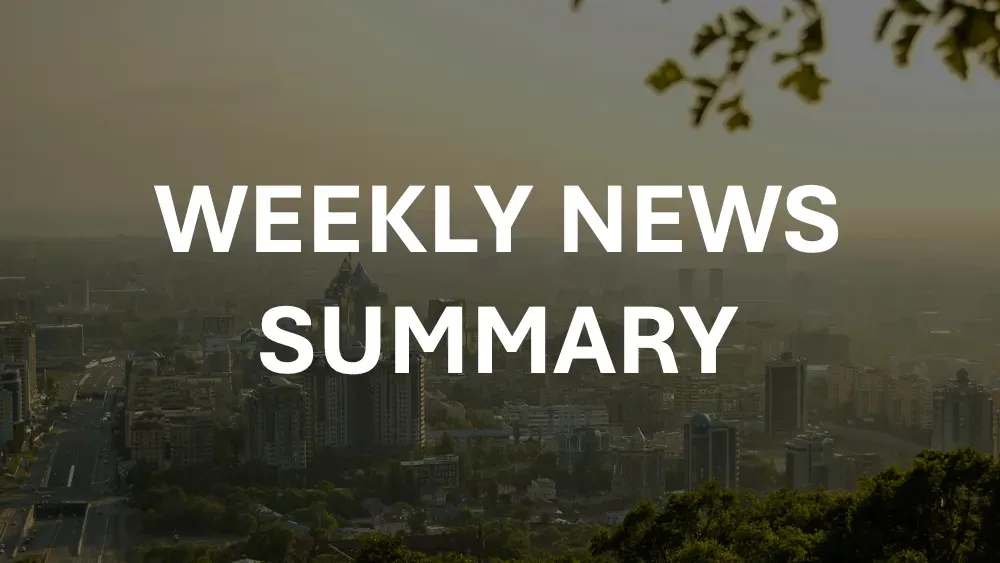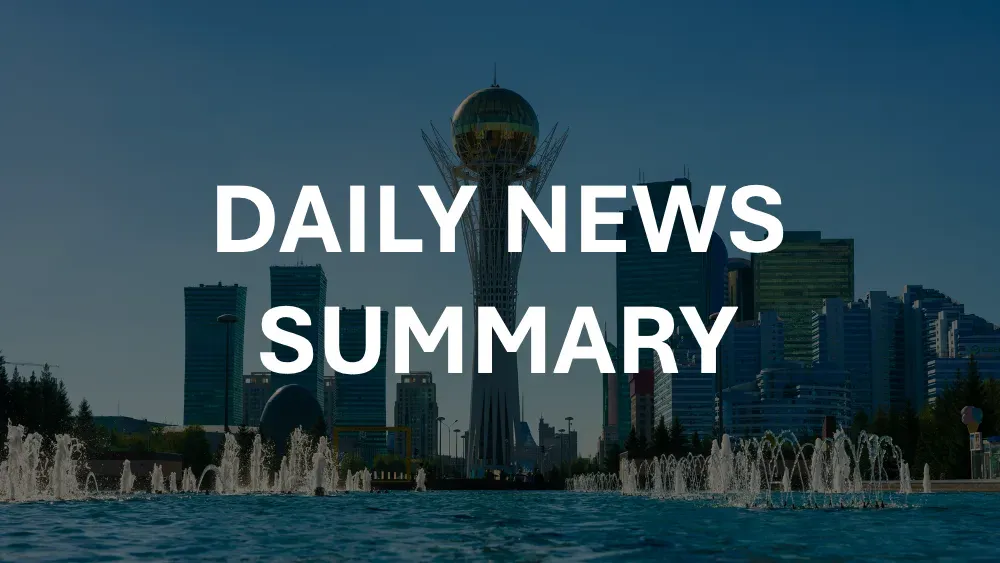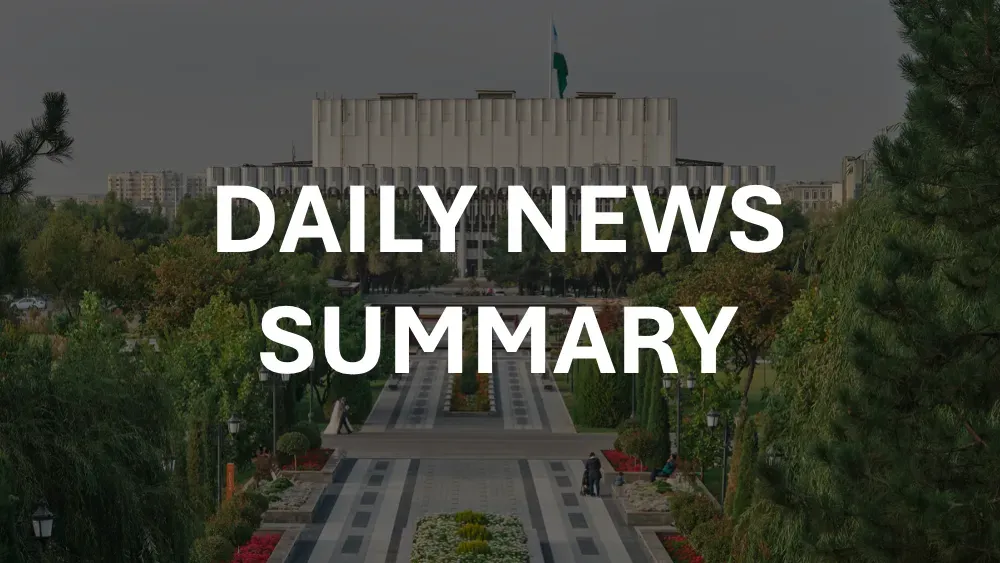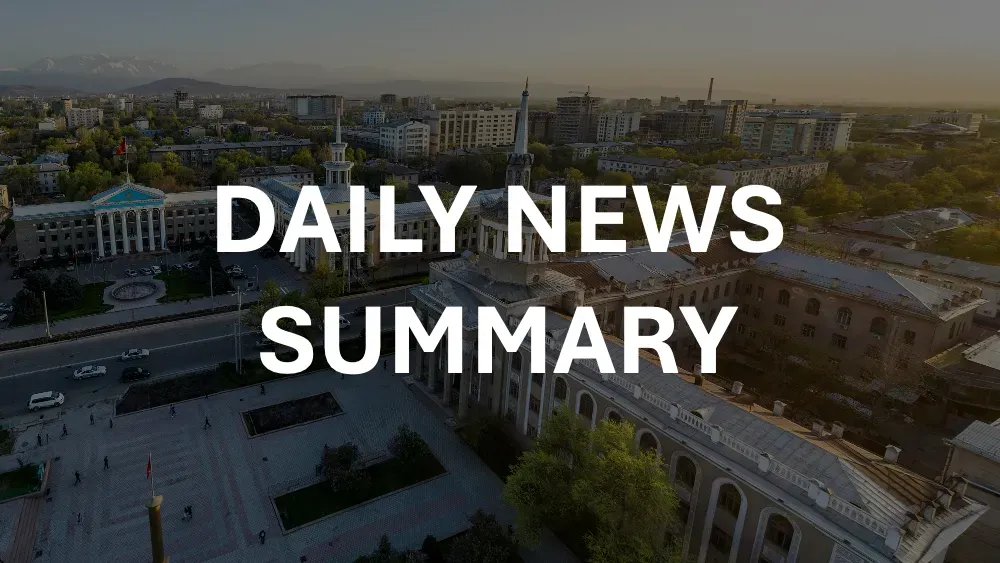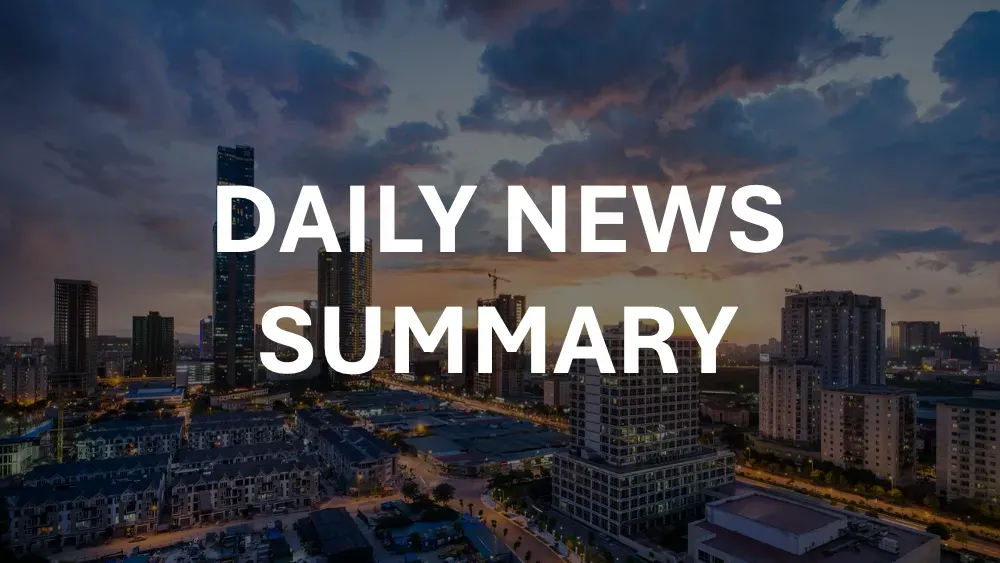This weekly digest showcases just 10 stories. Daily subscribers receive comprehensive intelligence briefs with 40 of the top stories organized by category. Don't miss the stories that matter.
Subscribe to Daily →
September 19, 2025 to September 25, 2025
This week's top 10 stories from Kazakhstan, selected from our daily intelligence briefs.
1. President Highlights Overland Trade Role, Warns of Politicized Investment Flows at UN General Assembly
At the UN General Assembly’s 80th session, President Kassym-Jomart Tokayev cast Kazakhstan as a strategic Eurasian logistics hub—saying the country handles roughly 80% of overland cargo between Asia and Europe—and warned that rising politicization of investment flows and sanctions risks could fragment geoeconomic ties and threaten supply-chain and corridor development. He urged a neutral investment climate to sustain transcontinental routes and flagged potential headwinds from politicized investment screening, while calling for comprehensive UN reform, including rotating Security Council seats for Asia, Africa and Latin America and greater representation for middle powers.
Tokayev also advanced Kazakhstan’s calibrated diplomacy: meeting with France’s Emmanuel Macron to deepen cooperation on energy, transport-logistics, agriculture and health, and holding talks with Ukraine’s Volodymyr Zelensky while reiterating that Kazakhstan will not act as a mediator in the Russia–Ukraine conflict. He pressed for renewed nuclear dialogue, a biological-safety agency, humanitarian access in Gaza, and emphasized climate, water risk, digital/AI priorities and domestic reforms—signaling a policy of balanced engagement to protect trade-dependent interests and regional stability.
Local Coverage: inform.kz, aikyn.kz, malim.kz, egemen.kz, informburo.kz, dknews.kz, zakon.kz
From daily briefs: 2025-09-24, 2025-09-25
2. Chevron and KazMunayGas Sign Cooperation Deal to Advance Strategic Energy Projects
Chevron, through subsidiary Chevron Munaigas Inc., and state-owned KazMunayGas (KMG) signed a cooperation agreement in New York to deepen collaboration on strategic projects including technology adoption, local content development, and workforce training. The deal reinforces long-standing joint operations across Tengiz, Karachaganak and the Caspian Pipeline Consortium—assets that underpin roughly a quarter of Chevron’s global output from Kazakhstan and have attracted nearly $55 billion of Chevron investment since Kazakhstan’s independence. KMG Chair Askhat Khasenov and Chevron Eurasia President Derek Magness framed the agreement as a productivity, safety and sustainability upgrade consistent with U.S.–Kazakhstan energy cooperation.
The leaders also used meetings between President Kassym-Jomart Tokayev and Chevron CEO Michael Wirth to advance specific priorities: the Tengiz Future Growth Project, increased gas production and processing at Karachaganak, and diversification of export routes (including the Trans‑Caspian “Middle Corridor”) to mitigate transit risk and add domestic gas value chains. The pact signals continued large-scale investment and operational continuity in Kazakhstan’s hydrocarbons sector while emphasising transparency, local content and industrial safety as central to future development.
Local Coverage: informburo.kz, aikyn.kz, dknews.kz, egemen.kz, inform.kz, zakon.kz
From daily briefs: 2025-09-23, 2025-09-24
3. Energy Ministry Tightens Procurement Rules, Mandates 80% Local Content for Oil and Gas Operations
Kazakhstan’s Energy Ministry has tightened hydrocarbons procurement rules, now requiring subsoil users and their contractors to source at least 80% of goods, works and services from domestic suppliers for oil and gas exploration and production. The full regulatory text and effective date have not been published, but the policy clearly raises the local content threshold and will apply to procurement during exploration and production operations.
For international operators this signals potentially significant compliance, commercial and supply-chain adjustments: vendor portfolios and tender eligibility may need to be restructured, contracts re‑priced or re‑scoped, and partnerships with Kazakh suppliers expanded to qualify under the 80% rule. The move aligns with broader government efforts to boost domestic industrial capacity and retain more economic value from the energy sector, and could affect project timelines and contractor selection until implementing regulations are clarified.
Local Coverage: inform.kz
From daily brief: 2025-09-23
4. KazMunayGas and LanzaJet Sign Framework Deal to Build Sustainable Aviation Fuel Plant
KazMunayGas (KMG) and U.S. advanced-fuels firm LanzaJet signed a framework agreement in New York to develop a sustainable aviation fuel (SAF) production plant in Kazakhstan. The accord, signed by KMG Chairman Askhat Khasenov and LanzaJet CEO Jimmy Samartzis, aims to localize LanzaJet’s Alcohol-to-Jet technology—which converts ethanol into SAF—and supports KMG’s diversification and decarbonization strategy. Key commercial details such as project location, capacity, feedstock sources and timeline were not disclosed.
Strategically, the deal positions Kazakhstan to participate in growing global SAF demand driven by airline net‑zero commitments and regulatory mandates (notably in the EU), and could catalyze new regional supply chains and investment in biofuels. While feedstock may come from domestic bioethanol production or imports, the framework’s realization will depend on further commercial agreements, financing and policy support.
Local Coverage: inform.kz
From daily brief: 2025-09-23
5. International Lenders Ready to Finance Beineu–Sekkseuıl Road and Middle Corridor Upgrades
Kazakhstan is moving ahead with state-backed financing and expects major international lenders to support upgrades along the Trans‑Caspian International Transport Route, prioritizing the 765 km Beineu–Sekkseuıl and Bozoy–Shalkar highway segments. The Transport Ministry plans to finalize the feasibility study and start construction soon; the EBRD and World Bank have signaled intent to provide over 800 billion tenge in financing. Separately, Kazakhstan Temir Zholy’s “Transforming Rail and Connectivity in Kazakhstan (Middle Corridor Development)” project is under consideration by the World Bank and AIIB, while the Islamic Development Bank is targeting utilities and engineering works in special economic and industrial zones.
Officials say these coordinated road, rail and utility investments are designed to strengthen Kazakhstan’s role as a Eurasian transit hub, improve the investment climate and business environment, and could raise manufacturing gross value added by about 6.1% by 2030. For international stakeholders, the package signals sizeable multilateral engagement and a strategic push to shorten and bolster Middle Corridor links between Central Asia and Europe.
Local Coverage: egemen.kz
From daily brief: 2025-09-19
6. US Locomotive Deal Signals Deeper Role in Middle Corridor Infrastructure
The United States and Kazakhstan have agreed to deliver 300 freight locomotives, a deal U.S. analysts say signals Washington’s deeper commercial and strategic engagement in the Middle Corridor — the transport route linking Central Asia to Europe via the Caspian Sea and South Caucasus. The purchase embeds U.S. industry within an alternative supply chain to northern routes constrained by sanctions and geopolitical risk, while supporting Kazakhstan’s freight throughput targets and ongoing rail modernization.
Analysts argue the transaction could accelerate standardization, financing and technology partnerships across the corridor, and catalyze upgrades in rolling stock, signaling and logistics hubs that improve East–West connectivity across Eurasia. The source article provided no official quotes; the timing and implementing agencies were not specified.
Local Coverage: inform.kz
From daily brief: 2025-09-26
7. Finance Minister Says Tax Overhaul Needed to Curb Deficit as Social Spending Limits Cuts
Kazakhstan is launching a tax overhaul to tackle a growing budget deficit after its government concluded most public spending cannot be cut, Trade and Integration Minister Serik Zhumangarin said. Citing post‑COVID pressures, the minister noted that higher social spending on wages, pensions and benefits over the past five years—and large fiscal injections in 2022–2023—have “locked in” costs, with the ministry finding that 98% of expenditures are non‑reducible. The cabinet has been tasked with lowering the deficit and eventually reducing reliance on borrowing, so the reform’s primary aim is revenue mobilization where spending restraint is infeasible.
Implications: for international investors and policymakers, the move signals Kazakhstan will prioritize tax measures rather than austerity to restore fiscal balance, potentially affecting business taxation, investment incentives and sovereign financing needs. The timing follows significant pandemic-era fiscal expansion, and details of the reform will determine its impact on growth and debt dynamics.
Local Coverage: egemen.kz
From daily brief: 2025-09-25
8. Deals With U.S. Majors Advance AI, Logistics, and Industry During New York Visit
During a New York working visit, President Kassym-Jomart Tokayev secured 11 agreements and memorandums valued at roughly $5.2 billion with major U.S. companies and institutions—including Wabtec (rail manufacturing, ~$4.2bn), PepsiCo ($368m snacks plant in Almaty Region), and Amazon’s Project Kuiper (nearly $200m ground infrastructure in Almaty, Akkol and Aktau). The deals span rail modernization, logistics and smart-corridor development, AI pilots and digital infrastructure, petrochemicals and low‑carbon fuels, and satellite broadband, signaling near‑term pilots with potential multi‑year capital and technology transfer across Kazakhstan’s transport, energy and IT sectors.
Tokayev framed the outreach as part of a pragmatic diversification strategy to deepen U.S. commercial ties—citing over $100bn cumulative U.S. FDI and 630+ American firms in Kazakhstan—and emphasized energy and critical‑minerals cooperation. He highlighted Kazakhstan’s outsized role in uranium (supplying ~40% of global demand and ~24% of U.S. imports), invited expanded geological exploration and value‑added processing of copper, lithium, tungsten and graphite, and reiterated a balanced energy mix that will continue to include coal in the near term. For international investors and supply‑chain planners, the package points to accelerated rail and digital connectivity along the Trans‑Caspian corridor, enhanced bilateral energy security links, and scoped opportunities for U.S. firms in mining, nuclear fuel, and industrial modernization.
Local Coverage: inform.kz, zakon.kz, egemen.kz, aikyn.kz, malim.kz, dknews.kz
From daily briefs: 2025-09-22, 2025-09-23, 2025-09-24, 2025-09-25
9. IAEA Backs Kazakhstan’s Nuclear Power Program with Comprehensive Support Plan
At the IAEA General Conference, Kazakhstan’s Atomic Energy Agency chief A.M. Satkaliyev and IAEA Director General Rafael Grossi agreed on comprehensive support for Kazakhstan’s planned nuclear power program, including plant construction, infrastructure and broader civilian uses of nuclear technology in industry, agriculture and healthcare. Grossi confirmed the IAEA will provide "end-to-end" assistance—from site selection and construction readiness to commissioning—backed by technical missions and departmental cooperation through 2027; the parties will draft a joint roadmap for 2025–2027.
Discussions also covered a balanced approach to uranium resource management and secure global supplies, Kazakhstan’s intention to form an international consortium to build the plant, new research projects, and a facility for safe storage of high-enriched fuel. The IAEA’s formal commitment and a multiyear roadmap signal strengthened international oversight and capacity-building that could accelerate Kazakhstan’s deployment timeline while aligning national development with non‑proliferation and safety obligations.
Local Coverage: dknews.kz
From daily brief: 2025-09-19
10. AI and Digital Development Ministry Established, Innovation Mandate Shifted to Education Sector
Kazakhstan’s President Kassym-Jomart Tokayev has issued a decree reorganizing the Ministry of Digital Development, Innovations and Aerospace Industry into the Ministry of Artificial Intelligence and Digital Development and transferring innovation policy responsibilities to the Ministry of Science and Higher Education. The executive order charges the government with reallocating staff and implementing structural changes across affected bodies, effectively consolidating AI strategy and digital governance under a single ministry while aligning research, innovation oversight and commercialization with higher education.
For international investors and tech companies, the change clarifies policy ownership for AI, data governance and digital infrastructure and may streamline public–private engagement with universities for talent and R&D. The move signals a strategic shift toward tighter integration of academic research and technology commercialization in Kazakhstan’s innovation ecosystem.
Local Coverage: inform.kz, zakon.kz, malim.kz, egemen.kz
From daily brief: 2025-09-19
About This Weekly Digest
The stories above represent the most significant developments from Kazakhstan this week, selected through our AI-powered analysis of hundreds of local news articles.
Stories are drawn from our daily intelligence briefs, which synthesize reporting from Kazakhstan's leading news sources to provide comprehensive situational awareness for international decision-makers.
These weekly highlights are a small sample of what's happening. Daily subscribers get comprehensive briefings with 40 top stories that connect the dots between events, track developing stories, and provide the context you need for informed decision-making.
Upgrade to Daily →
